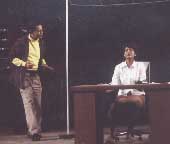 |
| Academic ethics: The student and the daughter in Chetana’s Nirnay |
Last week’s Outlook magazine announced the “Indian debut” in Bangalore of David Auburn’s Proof, which won both the 2001 Pulitzer and Tony awards and is now being filmed in Hollywood. For the record, Calcuttans may proudly protest that we got there first. Chetana’s latest production, Nirnay, premiered earlier, translated into Bengali by Arun Mukherjee, albeit disguised simply as “a foreign play”. As I have noted previously, it proves happily that Bengali theatre once again is keeping abreast of international developments.
Proof belongs to the recent dramatic interest in the interface of science and life (predecessors include Tom Stoppard’s Arcadia and Michael Frayn’s Copenhagen). It features a famous American mathematician whose talents ostensibly degenerated as he grew older, until the point that people considered him mentally disturbed. His younger daughter looked after him, at the expense of her own education and career. He died, but she apparently talks to his spirit (we do not realise this until later). A bright student of his sifts through his notebooks searching for valuable material. He finds evidence there that his teacher had solved a major arithmetical conundrum. However, the daughter claims it as her handiwork.
Auburn raises many issues, none of them innovatively, but explored in intellectually exciting ways. The idea of madness against sanity, and how we decide that someone has stepped over the fine line (others tell the daughter that she may have inherited her father’s abnormality). The critique of family ties, and the extent to which a parent has the right to pressure his child to care for him and neglect her individual needs. The examination of academic ethics, whereby the pupil’s integrity comes into question: is he seeking to vindicate his professor’s reputation, or just stealing the old man’s findings? And the matter of copyright, for how can we prove the original authorship of such research unambiguously if the father’s handwriting matches the daughter’s?
Mukherjee does not adapt, but translates faithfully. He directs sensitively, too, except for the usage of some hackneyed pieces of music. Manisha Adak portrays the troubled daughter with the right degree of tension and complexity. Sudeshna Sen Ray plays up her older sister as unsympathetic. Pradip Chakra-barti convinces as the self-centred genius, and Kamaleswar Mukherjee keeps us guessing about the student’s motives until an unnecessarily rosy-hued end.
And then there is Stoppard. The title The Importance of Being Stoppard elevates him on a pedestal, which we may balk at, but that aside, The Red Curtain’s undertaking is by far their most ambitious in their 35 years because it constitutes a double bill of two very difficult full-length scripts, Wilde’s Importance of Being Earnest and its Stoppardian takeoff, Travesties. Inevitably, this meant chopping two scintillating texts to fit an evening’s programme, the downside of the enterprise. Some of Wilde’s incomparable wit and Stoppard’s discourses on politics and art went out the window. Having said that, co-directors Katy Lai Roy and Ashoke Viswanathan did a successful job of condensing.
In their position, I might have inserted the compressed Earnest as a play within the play into Travesties where James Joyce starts describing Earnest to Henry Carr, rather than begin with Earnest and end with Travesties separately.
Between them, I prefer the treatment given to Travesties, in which Carr, a British consular officer in Zurich, encounters Joyce, Lenin and the Dadaist Tristan Tzara in 1917, to his utter befuddlement. Earnest seems to skate on the surface, though this may come from satirical interpretation of its society as superficial. But I read the ladies’ characters as deeper than depicted, and in general think that the lead performers could do better homework in building their roles. In contrast, the sparkling theatricality in presenting Travesties works very well, particularly the multiple takes of episodes suggesting Carr’s uncertain memory. To stress this fun element, the first sequence of limericks could be underlined with deliberate metrical delivery and perhaps a drum flourish after each limerick.
The cast carry their double load valiantly. Ashok Lath’s Algernon is a weak link, but he makes up as the clueless old Carr. Viswanathan sustains Tzara’s French manners and accent with aplomb. Perhaps best of all, Dhruv Mookerji expresses the opposite demands of an amorous Jack and a cranky Joyce. Utpal Chatterjee and Punam Singh even speak Russian as Mr and Mrs Lenin (naturally twinned as Canon Chasuble and Miss Prism), though somewhat handicapped by the loss of many prized Lenin speeches to editing. Nandini Das (Gwendolen) and Bornila Chatterjee (Cecily) suffer from the artifice imposed on Wilde and Stoppard’s own neglect of the women in Travesties, but sing an excellent puppet joust choreographed by Dana Roy.










